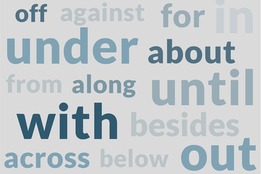We'll start with something basic. This is a biggie, because almost every sentence has one: the subject. It's the word or phrase that performs the action in a sentence. ("Action" here is being used loosely; many sentences have nothing we'd typically call "action." Another way of putting it is that the subject is the word or phrase that does the "doing" or "being" in a sentence, whatever that doing or being may be.) To get all grammar-splainy here, subjects are technically nouns, noun phrases, or pronouns. Here are some subjects being subjects, but in bold:
I hear yodeling.
The yodeling is coming from over there.
Information about grammar can apparently be yodeled.
Those grammarians are excellent yodelers.
There is another yodeling grammarian.
We are surrounded by yodeling grammarians.
Help.
Note that the subject usually comes first. In the fifth sentence, though, it comes after the verb is. This is because the there at the beginning of the sentence is really just a place holder.
Note too that not every sentence has a visible subject. In the last sentence, there is an understood (and, in this case, desperately hoped-for) subject that is "you" (or "someone" or "anyone").





















